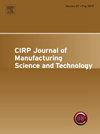基于 SVR 的刀具磨损预测,采用混合差分进化和灰狼优化算法进行优化
IF 4.6
2区 工程技术
Q2 ENGINEERING, MANUFACTURING
CIRP Journal of Manufacturing Science and Technology
Pub Date : 2024-09-27
DOI:10.1016/j.cirpj.2024.09.013
引用次数: 0
摘要
刀具磨损预测是确保产品质量和加工效率的关键。然而,大多数模型的预测结果不稳定或不准确。针对这些问题,本文提出了一种基于支持向量回归的刀具磨损预测模型,该模型通过差分进化和灰狼优化算法进行了优化。该方法通过差分进化和灰狼优化算法对支持向量回归模型的参数进行优化,使模型的全局和局部搜索能力更加均衡。首先,通过传感器采集铣削过程中的振动和功率信号。然后,对振动和功率信号进行特征提取和特征选择。然后,开发并训练所提出的模型。最后,使用提出的模型预测刀具磨损。结果表明,所提出的模型在预测精度和预测效率方面都优于其他模型,并且适用于多种切削参数条件,具有普适性,这将为机械加工提供一些有价值的技术支持。本文章由计算机程序翻译,如有差异,请以英文原文为准。
Tool wear prediction based on SVR optimized by hybrid differential evolution and grey wolf optimization algorithms
Tool wear prediction is key to ensuring product quality and machining efficiency. However, the prediction results of most models are unstable or inaccurate. To address the issues, a tool wear prediction model, based on support vector regression which was optimized by differential evolution and gray wolf optimization algorithms, was proposed in this paper. The method optimized the parameters of support vector regression model through differential evolution and grey wolf optimization algorithms to make the model more balanced in terms of its global and local search capabilities. First, the vibration and power signals were collected by sensors during the milling processes. Then, the features extraction and features selection were performed on the vibration and power signals. Next, the proposed model was developed and trained. Finally, the tool wear was predicted using the proposed model. The results showed that the proposed model had better performance than other models in terms of prediction accuracy and prediction efficiency, and it was applicable to the condition of multiple cutting parameters with generalizability, which will provide some valuable technical support for machining.
求助全文
通过发布文献求助,成功后即可免费获取论文全文。
去求助
来源期刊

CIRP Journal of Manufacturing Science and Technology
Engineering-Industrial and Manufacturing Engineering
CiteScore
9.10
自引率
6.20%
发文量
166
审稿时长
63 days
期刊介绍:
The CIRP Journal of Manufacturing Science and Technology (CIRP-JMST) publishes fundamental papers on manufacturing processes, production equipment and automation, product design, manufacturing systems and production organisations up to the level of the production networks, including all the related technical, human and economic factors. Preference is given to contributions describing research results whose feasibility has been demonstrated either in a laboratory or in the industrial praxis. Case studies and review papers on specific issues in manufacturing science and technology are equally encouraged.
 求助内容:
求助内容: 应助结果提醒方式:
应助结果提醒方式:


